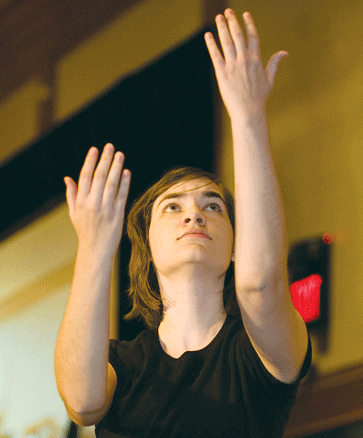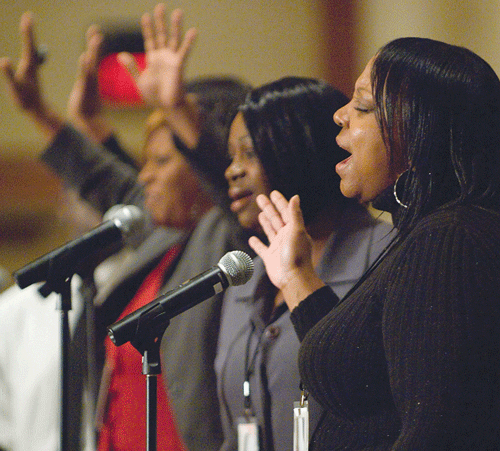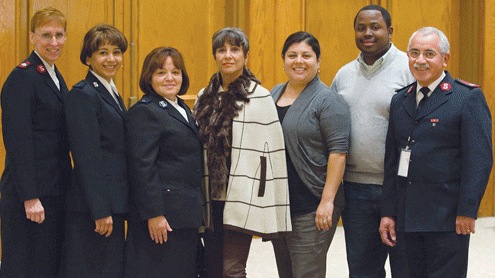 Conference stressed relationship between Christianity and migration
Conference stressed relationship between Christianity and migration
The 13th biennial Salvation Army Multicultural Ministries Conference took place in Chicago in mid-October to reinforce the vision of ministry work within communities of different backgrounds and cultures. Seven delegates from the Western Territory attended—two representing the Southern California Division and five as members of the THQ Multicultural Ministries Department. They share the experience here.
Migration and the Bible
By Elicio Marquez, Major
Many biblical heroes cross borders to fulfill the design of God.
Abraham was an immigrant who had only promises when he left his land of hunger and scarcity, which reminds me today that there are many immigrants coming with pain in their heart, leaving land and relatives in search of what they need, some acting with honesty and others having to lie to authorities. Abraham said at the border that Sarah was his sister, when in fact it was his wife.
We also have Joseph, a young man, sold by his brothers and forced to cross borders. Ruth, an immigrant who crossed borders for her family, did not want to break away from her mother, Naomi. Jesus was an immigrant, too. As a baby, his parents fled with him from Bethlehem to Egypt to save his life.
The good news is that Jesus looks out for all of us, including immigrants. As we read in Psalm 146:9, The Lord watches over the alien and sustains the fatherless and the widow, but frustrates the plans of the wicked.
We must remember that what we do for our neighbor, we are doing for God (Matt. 25:34-40).
Welcome the stranger
By Pili Martinez Moore
The issue of immigration for those who live in the western U.S. is not unusual. We know these individuals have broken the law, we hear about it in the news, we fight about it, we talk about it, we have opinions about it, and believe it or not, many of our own soldiers and congregants in The Salvation Army are affected directly by it.
The conference workshop “Welcome abroad: A biblical response to the immigration debate,” discussed many of the myths and facts about illegal immigration. For example, although the majority of illegal immigrants in the U.S. are from Mexico and Central America, one in five are Korean, one in six are Filipino and one in eight are from Asian/Indian descent.
As Christians we are called to look at immigration in three ways: the biblical way, remembering that many biblical characters have a resemblance to the stories of immigrants today. We must also see it as ecclesiology, recognizing that our Christian roots were marked by immigrants who made a difference in the lives of others, as in the story of the Good Samaritan (Luke 10:25-37). And finally, we must view immigrants as missionary: in Matthew 28:19 the message is clear, Go therefore and make disciples of all nations.
With the face of America changing dramatically, remember your own immigration story; it’s very possible that you didn’t come from another country, but God took you from the darkness into the light. We must be ready to inform, educate and even fight as Christians for a renewed immigration debate in America with a Christian response to the issue. Let’s look at this issue as an opportunity and not a threat.
Ministering to Muslims
By Migdalia Roehl
It is expected that in the next 20 years, the U.S. Muslim population will reach 6.2 million, surpassing the Jews and making Islam the second largest religious faith after Christianity. With the growing trend of Islamic evangelism and various Muslim groups in our communities growing, the leaders of the church today cannot ignore this reality.
In the workshop “From one faith to another faith—incorporating Islam effectively into your world,” Naeem Fazel, a young man born in Pakistan and raised in Kuwait, presented on how to remove barriers and create bridges to reach our local Muslims for Jesus, including the following elements of evangelizing:
1. We must sincerely love them with the passion that Jesus Christ showed to us.
2. Offer a sincere friendship before trying to win them over.
3. Pray for them as if their salvation depended on your prayer.
4. Invite them over and over again without accepting a “no” for an answer.
5. Explain: God is Jehovah, Yahweh or Elohim (names of God in different languages); Allah is not the distant God, which only makes demands and dictates of obedience trials, that the Qur’an shows us; God became the sacrifice for the world rather than animals; Jesus was a great prophet but is also the son of God and was resurrected; and everyone can go to church—converted or not.
I am praying that God will use my life, somehow, because I feel a burden and an obligation to do something for these people of different ethnic groups that are lost even in our own surroundings.
The church, reflecting the community
By Maryuli Darby
 Dr. Mark Deymez, pastor of Mosaic Church of Central Arkansas and author of several books, directed the conference workshop, “Building a healthy multiethnic church: The terms, commitments and practices of a diverse congregation.” He focused on the seven core commitments of a multiethnic church: embrace the dependence, make intentional efforts, support diverse leadership, develop intercultural relations, expand our intercultural competence, foster a spirit of inclusion, and mobilize the purpose of impact.
Dr. Mark Deymez, pastor of Mosaic Church of Central Arkansas and author of several books, directed the conference workshop, “Building a healthy multiethnic church: The terms, commitments and practices of a diverse congregation.” He focused on the seven core commitments of a multiethnic church: embrace the dependence, make intentional efforts, support diverse leadership, develop intercultural relations, expand our intercultural competence, foster a spirit of inclusion, and mobilize the purpose of impact.
“Demographic changes have transformed North America,” Deymez explained. “The failure to recognize the changing social landscape, will soon turn your work, or worse, his message, irrelevant.”
It is important to note the difference between assimilation and adaptation.
“In an increasingly diverse society and in turn cynical, people do not find credible the message of God’s love for all people, when it is preached from pulpits and churches segregated,” Deymez said. “Without realizing, it undermines the message of Jesus Christ and a God who loves all people, regardless of the color of their skin.”
We must change our thinking. The church is not a bridge that connects the community; the church should be a reflection of the community it serves.











